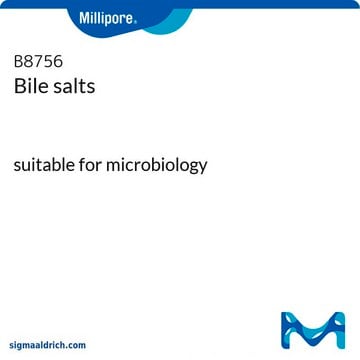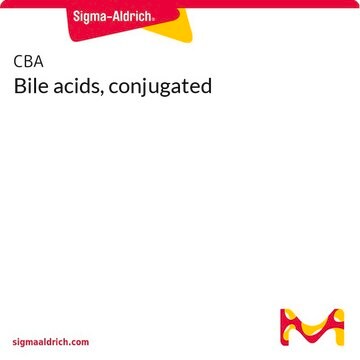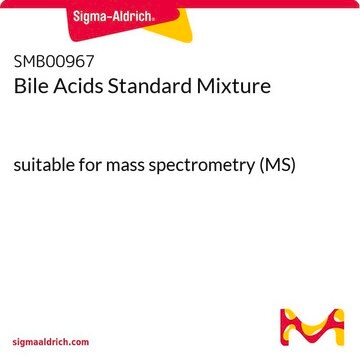B8381
Galle bovine und ovine
bile acid mixture
Synonym(e):
Bile acids
Anmeldenzur Ansicht organisationsspezifischer und vertraglich vereinbarter Preise
Alle Fotos(3)
About This Item
Empfohlene Produkte
Biologische Quelle
bovine
ovine
Qualitätsniveau
Form
powder
Methode(n)
microbiological culture: suitable
Anwendung
Galle aus Rindern und Schafen kann in der bakteriologischen Forschung eingesetzt werden, um die Anpassung von Bakterien wie Lactobacillus an Gallensalz zu untersuchen.
Zur Verwendung in der Bakteriologie.
Biochem./physiol. Wirkung
Die Bildung von Gallensäuren aus Cholesterin ist wesentlich für die Cholesterinhomöostase. Folglich arbeiten Gallensäuren und Alkohole an der Absorption von Lipiden aus dem Magen-Darm-Trakt. Die Klasse besteht aus einer komplexen Mischung ähnlicher Verbindungen, die ein schwieriges analytisches Problem darstellt. LC/MS und GC/MS wurden erfolgreich zum Aufklären solcher Mischungen eingesetzt.
Komponenten
Mischung aus freien und konjugierten Gallensäuren, mindestens 50 % Gallensalze
H-Sätze
P-Sätze
Gefahreneinstufungen
Aquatic Chronic 3
Lagerklassenschlüssel
11 - Combustible Solids
WGK
WGK 2
Flammpunkt (°F)
Not applicable
Flammpunkt (°C)
Not applicable
Persönliche Schutzausrüstung
Eyeshields, Gloves, type N95 (US)
Analysenzertifikate (COA)
Suchen Sie nach Analysenzertifikate (COA), indem Sie die Lot-/Chargennummer des Produkts eingeben. Lot- und Chargennummern sind auf dem Produktetikett hinter den Wörtern ‘Lot’ oder ‘Batch’ (Lot oder Charge) zu finden.
Besitzen Sie dieses Produkt bereits?
In der Dokumentenbibliothek finden Sie die Dokumentation zu den Produkten, die Sie kürzlich erworben haben.
Kunden haben sich ebenfalls angesehen
A Paziewska-Harris et al.
The Journal of parasitology, 104(1), 96-100 (2017-11-03)
The long-term storage of Cryptosporidium life-cycle stages is a prerequisite for in vitro culture of the parasite. Cryptosporidium parvum oocysts, sporozoites, and intracellular forms inside infected host cells were stored for 6-12 mo in liquid nitrogen utilizing different cryoprotectants (dimethyl
Caroline Fässler et al.
European journal of nutrition, 45(8), 445-453 (2006-10-13)
Resistant starch (RS) is known for potential health benefits in the human colon. To investigate these positive effects it is important to be able to predict the amount, and the structure of starch reaching the large intestine. The aim of
A Paziewska-Harris et al.
Parasitology research, 115(7), 2873-2877 (2016-04-21)
Viability estimation of the highly resistant oocysts of Cryptosporidium remains a key issue for the monitoring and control of this pathogen. We present here a simple 'one tube' quantitative PCR (qPCR) protocol for viability estimation using a DNA extraction protocol
Erwann Hamon et al.
Journal of proteome research, 11(1), 109-118 (2011-11-02)
The identification of cell determinants involved in probiotic features is a challenge in current probiotic research. In this work, markers of bile tolerance in Lactobacillus casei were investigated using comparative proteomics. Six L. casei strains were classified on the basis
Fabiane Cristina Petry et al.
Food & function, 8(11), 3951-3963 (2017-10-04)
The composition of carotenoids (carotenes and free and acylated xanthophylls) and their bioaccessibilities were determined for the first time in pulps of mandarins cultivated in Brazil. Two cultivars of mandarin, Citrus reticulata Blanco cv. 'Ponkan' and Citrus reticulata × C.
Unser Team von Wissenschaftlern verfügt über Erfahrung in allen Forschungsbereichen einschließlich Life Science, Materialwissenschaften, chemischer Synthese, Chromatographie, Analytik und vielen mehr..
Setzen Sie sich mit dem technischen Dienst in Verbindung.















